
AGREEMENT ON THE TRANSIT OF GOODS
BETWEEN
THE GOVERNMENT OF THE SOCIALIST REPUBLIC OF VIET NAM
AND
THE GOVERNMENT OF THE LAO PEOPLE’S DEMOCRATIC REPUBLIC
The Government of the Socialist Republic of Viet Nam and the Government of the Lao
People’s Democratic Republic, hereinafter referred to as “the Contracting Parties”;
Being desirous of further strengthening and expanding the economic and trade
cooperation relations between the two countries in order to develop the economy of each
country, on the principles of equality, mutual benefit, and special solidarity;
Have agreed as follows:
Article 1
1. The Contracting Parties shall permit goods of either Contracting Party exported to a
third country, or imported from a third country, or transported from one locality to
another locality of one Contracting Party, to be transited through the territory of the
respective Contracting Parties under the supervision of customs and other competent
authorities of the respective Contracting Parties.
2. The Contracting Parties shall facilitate the transit of goods by road between the two
countries, without causing any time delay to the course of transit, without issuing any
regulation that appears to be unnecessary barriers to the course of transit, and without
collecting customs duties, taxes and any unnecessary fee for the transit process in the
transit country.
Article 2
In this Agreement, terms are defined as follows:
1. Transit of goods means the transportation of goods owned by any natural or legal
person of the country applying for transit through the territory of the transit country by
road, including transshipment, portage, warehousing, shipment separation or alteration of
modes of transportation or other jobs performed during the course of transit under
customs and other competent authorities’ supervision.
2. The country applying for transit is the country where the natural or legal person
owning the goods in transit is located.
3. The transit country is the country through the territory of which the goods in transit
are allowed to pass.
4. The owner is the natural or legal person who owns the goods in transit.
5. The carrier is the legal person who is legally authorized by the owner to deliver the
goods in transit.

Article 3
The transit of goods shall be done in compliance with the following regulations:
1. The transport of goods in transit during the course of transit shall be compliant with
the customs and other relevant laws and regulations of the transit country and
international treaties to which the Contracting Parties are signatories.
2. The quantity and specification of the goods delivered through the last exit border gate
of the transit country shall be exactly the same as that delivered through the first entry
border gate of the transit country, and the goods shall be in its original conditions of
packing and customs sealing. If the goods are lost, damaged or broken during the course
of transit, the owner or the carrier shall report to local customs and/or other competent
authorities in accordance with the laws and regulations of the transit country to make a
written certification of the conditions of the goods. In case there is no local customs, the
owner or the carrier shall report the situation to the nearest local authorities to make such
a certification.
3. The goods in transit shall not be under routine customs physical inspection at the
border, customs escorts in the territory of the transit country in accordance with the
customs laws and regulations of the transit country. Physical inspection of the goods in
transit shall be conducted only in cases of suspicion or where signs of violation are
detected.
4. If the goods in transit are to be kept in warehouse or depot in the transit country, a
permit from the competent authorities of the transit country on time and places shall be
required and the goods shall be under the supervision of the customs authority of the
transit country.
Article 4
For the goods under the lists of goods banned from business, goods banned from export,
goods temporarily ceased from export, goods banned from import, goods temporarily
ceased from import of the Contracting Parties, their transit shall be done in compliance
with the following regulations:
1. Those goods which are banned from export, import or transportation by international
treaties that the Contracting Parties are signatories or under the lists of goods banned
from business, goods banned from export, goods temporarily ceased from export, goods
banned from import or goods temporarily ceased from import of both Contracting Parties
shall not be transited, unless otherwise provided in this Agreement.
2. The transit of weapons, ammunitions, explosives, or military technical equipment for
national defense and national security shall have a permit from the Prime Minister of the
transit country in compliance with the relevant laws and regulations of the transit country
following a written request by the Minister of Industry and Commerce/Minister of
Industry and Trade of the country applying for transit to the Minister of Industry and
Trade/Minister of Industry and Commerce of the transit country.
2

3. The transit of goods under the list of goods banned from business, goods banned from
export, goods temporarily ceased from export, goods banned from import or goods
temporarily ceased from import of the transit country but not under such a list of the
country applying for transit shall have a permit from the Minister of Industry and Trade/
Minister of Industry and Commerce of the transit country following a written request by
the Minister of Industry and Commerce/Minister of Industry and Trade of the country
applying for transit.
4. Goods under the lists of goods banned from business, goods banned from export,
goods temporarily ceased from export, goods banned from import or goods temporarily
ceased from import, once permitted to transit, shall be transported on the prescribed
roads, through the prescribed border gates, on the right means of transport and capacity,
and in timing as provided in the transit license, and shall be supervised by the customs
and other competent authorities of the transit country.
5. The lists of goods banned from business, goods banned from export, goods
temporarily ceased from export, goods banned from import or goods temporarily ceased
from import of each Contracting Party are provided in accordance with the laws and
regulations of the respective Contracting Party. Such lists as list by Viet Nam and list by
Lao PDR shall be informed within 60 days from the date of signing this Agreement by
the Ministry of Industry and Trade of the Socialist Republic of Viet Nam/Ministry of
Industry and Commerce of the Lao People’s Democratic Republic to the Ministry of
Industry and Commerce of the Lao People’s Democratic Republic/Ministry of Industry
and Trade of the Socialist Republic of Viet Nam in writing in English. Those lists may
be revised; in such a case the Ministry of Industry and Trade/Ministry of Industry and
Commerce shall inform the revised lists to the Ministry of Industry and Commerce/
Ministry of Industry and Trade, and the revised lists shall automatically replace the
previous lists.
Article 5
For those goods which are not under the scope of Article 4, when transited by road
through the pairs of border gates as prescribed under Article 6, the owner or the carrier
shall apply and make customs clearance for the goods in transit only at those pairs of
border gates. No permit from the Minister of Industry and Trade/Minister of Industry and
Commerce of the transit country is required.
Article 6
The transit of goods shall be made through the following pairs of border gates and
associated routes:
Viet Nam’s border gates Associated
routes
Laos’ border gates
Lao Bao
(Quang Tri province)
Road No. 9 Densavanh
(Savannakhet province)
Cau Treo
(Ha Tinh province)
Road No. 8 Nam Phao
(Bolykhamxay province)
3

Viet Nam’s border gates Associated
routes
Laos’ border gates
Na Meo
(Thanh Hoa province)
Road No. 217 Nam Soi
(Huaphan province)
Tay Trang
(Dien Bien province)
Road No. 42 Pang Hok
(Phongsaly province)
Nam Can
(Nghe An province)
Road No. 7 Nam Kanh
(Xiengkhuang province)
Cha Lo
(Quang Binh province)
Road No. 12 Na Phaou
(Khammuane province)
Bo Y
(Kon Tum province)
Road No. 18 Phou Keua
(Attapeu province)
In order to facilitate the transit of goods, if there is a need, other pairs of border gates
would be opened for goods in transit with mutual consent of the Contracting Parties.
Article 7
1. It is prohibited to distribute, sell or consume goods in transit under the lists of goods
banned from business, goods banned from export, goods temporarily ceased from export,
goods banned from import or goods temporarily ceased from import in the territory of
the transit country.
2. For goods in transit which are not under the lists referred to in paragraph 1 of this
Article, their consumption in the territory of the transit country would only be permitted
in case of force majeure and when it is so approved by the Minister of Industry and
Trade/Minister of Industry and Commerce of the transit country, and the goods shall be
subject to duties and other charges and fees in accordance with the laws and regulations
of the transit country.
Article 8
1. The collection of charges and fees, including but not limited to road fee, overload
charge, administration fee, facility and service charge, fuel charge and duty applied for
fuel purchased in the transit country, and road maintenance fee, shall be applied in
accordance with the laws and regulations of the transit country.
2. Payment of charges and fees arising from activities related to goods in transit shall be
made in the local currency of the transit country or in a freely convertible currency in
accordance with the laws and regulations on foreign exchange of each Contracting Party.
Article 9
1. The goods in transit shall be tranported by a carrier duly licensed or authorized in
compliance with the laws and regulations of each Contracting Party.
4

2. The transit of means of transportation and escorting people as well as the
transshipment, or change of means of transportation shall be compliant with the
international treaties to which the Contracting Parties are signatories. In case no relevant
provisions are found in such international treaties, the above activities shall be made in
compliance with the laws and regulations of the transit country.
Article 10
The Contracting Parties agreed to authorize the Ministry of Industry and Trade of the
Socialist Republic of Viet Nam and the Ministry of Industry and Commerce of the Lao
People’s Democratic Republic, subject to the specific conditions in each period, to
negotiate and conclude arrangements on detailed documentary forms, including a set of
transit documents, for the implementation of this Agreement.
Article 11
Any violation by the owner or the carrier to the laws and regulations of the transit
country during the course of transit shall be sanctioned in accordance with the relevant
laws and regulations of the transit country.
Article 12
Any dispute arising from the interpretation or implementation of this Agreement shall be
amicably and duly settled by consultation between the authorized representatives of the
Contracting Parties through diplomatic channels.
Article 13
A written request is required if either Contracting Party desires to make any amendment
of or addition to this Agreement within the validity of this Agreement. Within 90 days
from the date of receipt of such a request, the other Contracting Party shall formally
respond in writing. The amendments of or additions to this Agreement made by the
Contracting Parties shall form an integral part of this Agreement and shall have the same
validity as this Agreement.
Article 14
1. This Agreement shall come into force after 60 days from the date of signing and be
valid for two years. In case within 60 days prior to the expiry of this Agreement, none of
the Contracting Parties give the other Contracting Party a written notice of its desire to
terminate this Agreement through diplomatic channels, the validity of this Agreement
shall be automatically renewed for one more year. This form of validity renewal shall be
similarly applied for the successive periods of one year.
2. In case a Contracting Party gives the other Contracting Party a written notice of its
desire to terminate this Agreement through diplomatic channels, this Agreement shall be
terminated after 60 days from the date of receipt of such a notice.
3. In case of termination of this Agreement, its provisions shall still be applied to other
related arrangements which have been signed before the date of termination until full
completion of these arrangements.
5

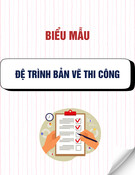
![Mẫu Yêu cầu cung cấp thông tin [mới nhất]](https://cdn.tailieu.vn/images/document/thumbnail/2025/20250802/kiendinhnd/135x160/43321754296830.jpg)
![Mẫu đệ trình xin phê duyệt [chuẩn nhất]](https://cdn.tailieu.vn/images/document/thumbnail/2025/20250802/kiendinhnd/135x160/88141754296831.jpg)



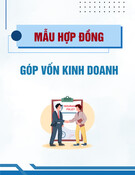



![Quyết định số 2024/QĐ-HVTP: Thông tin chi tiết và [thêm mô tả nếu có nội dung cụ thể]](https://cdn.tailieu.vn/images/document/thumbnail/2025/20251017/vietbankabc@gmail.com/135x160/33251760755573.jpg)
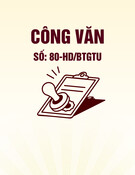


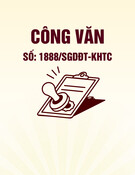

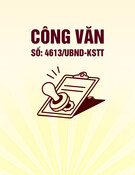
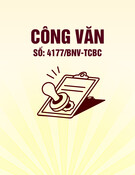
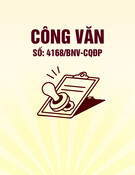
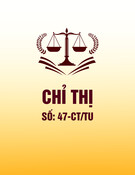
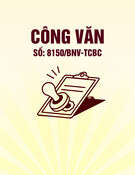
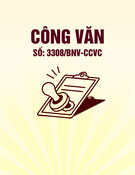

![Hướng dẫn số 63-HD/BTGTU: [Thêm thông tin chi tiết về nội dung hướng dẫn để tối ưu SEO]](https://cdn.tailieu.vn/images/document/thumbnail/2025/20251014/nganga_01/135x160/37011760493191.jpg)

